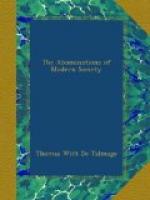There are multitudes of people who disapprove of ordinary lotteries, yet have been thoroughly deceived by iniquity under a more attractive nomenclature. The lottery in which our most highly respectable and Christian people invest is some “Art Association,” or some benevolent “Gift Enterprise,” in which they fondly believe there can be no harm in drawing Bierstadt’s Yosemite Valley, or Cropsey’s American Autumn!
At no time have lottery tickets been sown so broadcast as to-day, notwithstanding the law forbids the old-style lottery.
A few years ago our newspapers flamed with the advertisements of the Crosby Opera House scheme. A citizen of Chicago, finding on his hands an unprofitable building, calls upon the whole country to help him out. Rooms are opened in all the great cities. In rush, not the abandoned and the reprobate (for they like the old styles of swindling better), but the educated and refined and polished, until a host of people are in imminent peril of having thrown upon their hands a splendid Opera House. Philadelphia buys thirty thousand dollars worth of tickets. The portentous day approaches. The rail trains from many of the prominent cities bring in dignified “Committees” who come to see that the great abomination is conducted in a decent and Christian manner. The throng presses in. Hold fast your tickets, all you respectable New Yorkers, Philadelphians, and Bostonians, for the wheel begins to move. The long agony is over. Hundreds of thousands of people have made a narrow escape from being ruined by sudden affluence. Swift horses are despatched, that, foam-lathered, dash up to the house of him who owns the successful ticket. The lightnings tell it to the four winds of heaven, and our weekly pictorials hasten forward the photographers to take the picture of the famous man who owned the ticket numbered 58,600. Multitudes think that there has been foul play, and that, after all, they themselves, if the truth were known, did draw the Opera House. Ten years from now there will stand on the scaffold, or behind the prison door, or in the lonely room in which the suicide writes his farewell to wife or parents, men who will say that the first misstep of their life that put them on the wrong road was the ticket they bought in the Crosby Opera House.
The man who won that prize is already dead of his dissipations, and, strange to say, the beautiful building thus raffled away was found to be owned by its original possessor when all the excitement in regard to the matter had died away.
I care not on what street the office was, nor who were the abettors of the undertaking, nor who bought the tickets. I pronounce the whole scheme to have been a swindle, a crime, and an insult to God and the nation.
In this class of gambler-makers I also put the “gift stores,” which are becoming abundant throughout the country. With a book, or knife, or sewing machine, or coat, or carriage there goes a prize. At those stores people get something thrown in with their purchase. It may be a gold watch or a set of silver, a ring or a farm. Sharp way to get off unsalable goods. It has filled the land with fictitious articles and covered up our population with brass finger-rings, and despoiled the moral sense of the community, and is fast making us a nation of gamblers.




